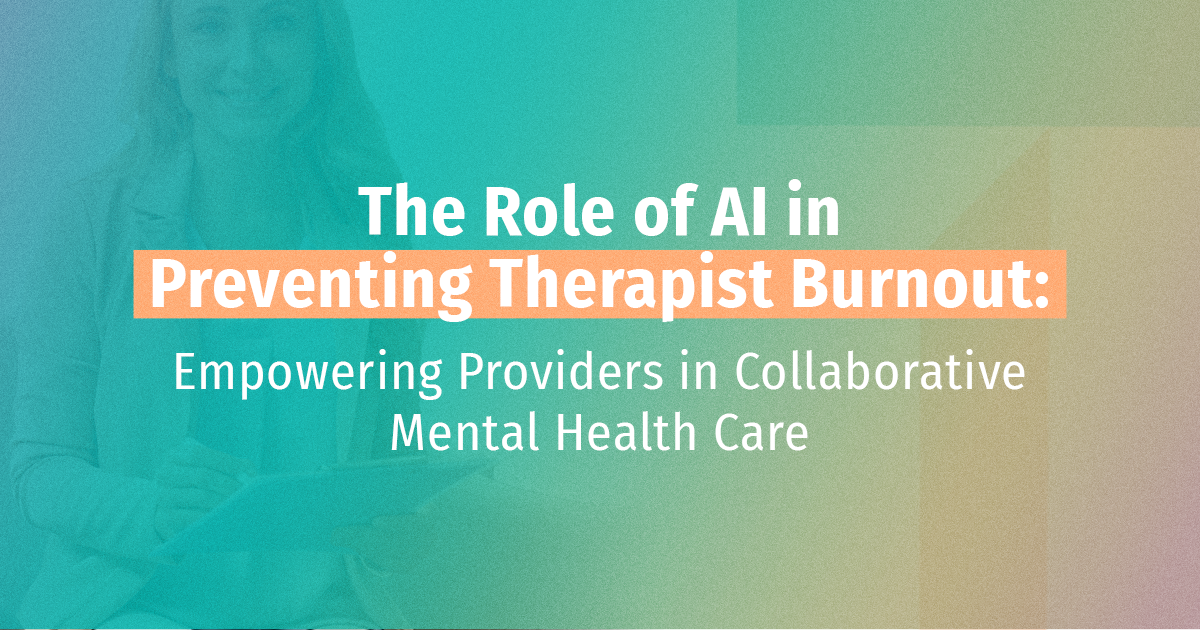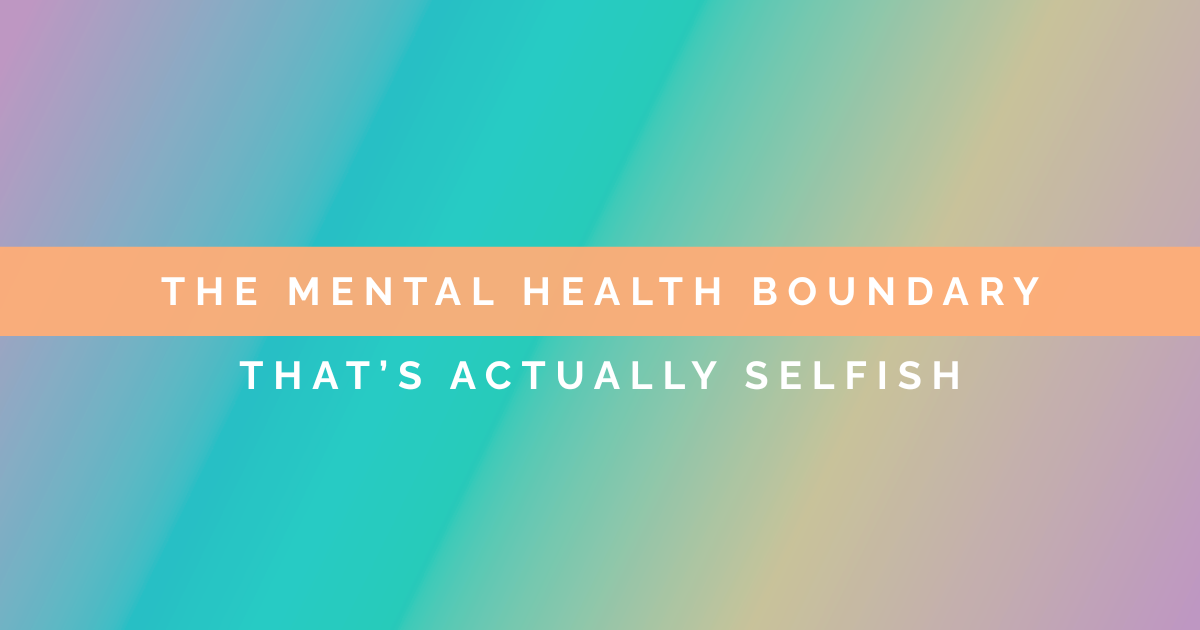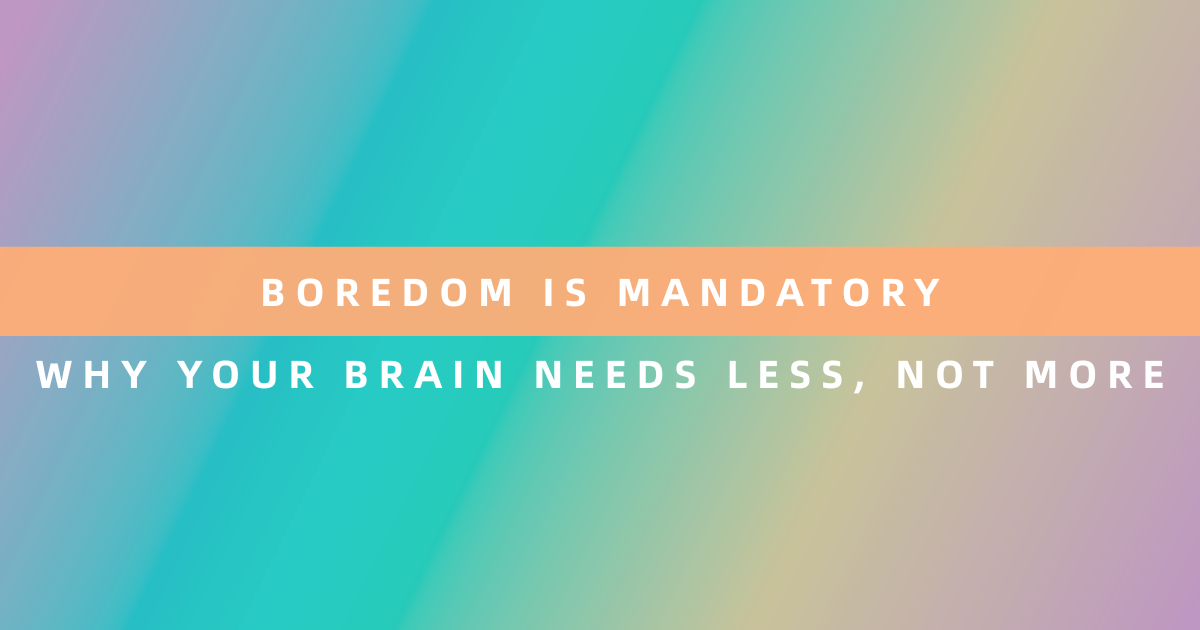Therapist burnout looms large over the mental health field. Caseloads grow heavier, paperwork piles up, and the emotional weight of client care takes its toll. But what if technology could lighten this load?
Artificial intelligence offers a helping hand to mental health professionals. It’s not about replacing the human touch – far from it. AI tools aim to free up therapists to do what they do best: provide compassionate, personalized care.
This article explores how AI prevents burnout by supporting providers and boosting collaborative care. We’ll examine ways these technologies streamline tasks and offer insights, allowing therapists to focus on their clients.
Remember, AI doesn’t define therapy’s future – therapists do. Think of AI as a sophisticated assistant, helping create a more sustainable and effective mental health care landscape for both providers and patients.
- Therapist Burnout
- AI as a Supportive Tool in Mental Health Care
- Empowering Providers through Collaborative Mental Health Care
- Reducing Administrative Burden: Freeing Therapists to Focus on Care
- AI-Driven Insights: Augmenting Therapist Expertise
- Expanding Reach: AI-Assisted Tools for Accessible Mental Health Counseling
- Best Practices for Integrating AI: Enhancing, Not Replacing, the Human Touch
- Addressing Concerns and Limitations of AI in Mental Health Care
- The Future of Provider-Centered AI in Mental Health Care
Therapist Burnout
Therapist burnout plagues the mental health profession. A 2015 study found that burnout rates among healthcare professionals, including mental health providers, were significantly higher compared to the general population [Shanafelt et al., 2015]. This alarming statistic highlights a growing crisis in mental health care.
Several factors fuel this burnout epidemic. Heavy caseloads top the list, with many therapists juggling more clients than they can effectively manage. Research has shown that work setting and gender can influence burnout rates among professional psychologists [Rupert & Kent, 2007]. Administrative tasks consume precious time, often forcing therapists to work long hours just to keep up with paperwork. The emotional demands of the job also take a toll, as therapists absorb their clients’ traumas and struggles day after day.
The consequences of burnout reach far beyond the therapists themselves. Patient care suffers when providers feel overwhelmed and emotionally drained. Maslach and Leiter (2016) explain that burnout can lead to decreased empathy, reduced effectiveness in treatment, and even errors in clinical judgment. In severe cases, it drives skilled professionals out of the field entirely, exacerbating the shortage of mental health providers.
The healthcare system bears the brunt of this crisis too. Kumar (2016) points out that high turnover rates in mental health practices disrupt continuity of care and increase costs. The loss of experienced therapists creates gaps in expertise that are hard to fill. Ultimately, burnout threatens the very foundation of quality mental health care.
Addressing therapist burnout requires innovative solutions. This sets the stage for exploring how AI can play a supportive role in easing the burdens that lead to burnout, without compromising the essential human element of therapy.
AI as a Supportive Tool in Mental Health Care
AI revolutionizes mental health care, not by replacing therapists, but by amplifying their capabilities. These technologies serve as powerful assistants, enhancing the therapeutic process while keeping the human element at the forefront. Topol (2019) argues that AI can actually make healthcare more human by freeing professionals to focus on patient care.
Machine learning algorithms analyze vast amounts of data, identifying patterns that might escape even the most experienced clinician’s eye. Natural language processing enables AI to understand and respond to human communication, facilitating more efficient intake processes and initial assessments. Below is an overview of AI’s current and future applications in psychological practice, from administrative tasks to clinical interventions.
Consider how AI enhances traditional therapy models:
- 1. Automated scheduling systems free up time typically spent on administrative tasks.
- 2. AI-powered note-taking tools capture session details, allowing therapists to focus fully on their clients.
- 3. Data analysis provides therapists with insights into client progress, informing treatment decisions.
Intelligent assistive technology can be applied to various aspects of care, including mental health, showcasing the potential for AI to support collaborative care approaches.
These applications don’t diminish the therapist’s role; they elevate it. By handling time-consuming tasks, AI allows mental health professionals to dedicate more energy to what truly matters: building relationships, providing empathy, and guiding clients through their healing journeys.
The key lies in viewing AI as a complement to human expertise, not a replacement. Therapists bring irreplaceable qualities to their work: emotional intelligence, ethical judgment, and the ability to build trust. AI amplifies these strengths by providing tools that streamline processes and offer data-driven insights.
As we explore further applications of AI in mental health care, remember: the goal is always to support and empower therapists, not to automate the deeply human practice of therapy itself.
Empowering Providers through Collaborative Mental Health Care
Collaborative mental health care transforms the therapeutic landscape, and AI serves as a catalyst for this shift. By enhancing communication and facilitating information sharing, AI-powered tools foster a team-based approach that benefits both therapists and clients.
AI-enhanced communication platforms bridge gaps between therapy sessions. Secure messaging systems allow clients to share thoughts or concerns as they arise, providing therapists with valuable context. These platforms use natural language processing to flag urgent issues, ensuring timely interventions when necessary.
Information sharing becomes seamless with AI. Electronic health records, augmented by machine learning, create comprehensive patient profiles. These systems synthesize data from various sources, offering therapists a holistic view of their clients’ health. This integration saves time and reduces the risk of overlooking crucial information.
Team-based approaches flourish under AI’s support:
- 1. Case conferencing tools use AI to summarize relevant client information, facilitating more efficient and productive team discussions.
- 2. Treatment plan collaboration platforms leverage AI to suggest evidence-based interventions based on client data and team input.
- 3. Progress tracking systems use AI to analyze data from multiple providers, offering a unified view of client improvement.
Therapists remain at the helm of this collaborative process. AI doesn’t make decisions; it provides information and suggestions that inform professional judgment. This support allows therapists to focus on interpreting data, crafting personalized treatment strategies, and building strong therapeutic alliances.
The result? A more connected, informed, and effective mental health care team. Therapists feel supported, not replaced, by technology. They can lean on AI-powered tools to handle data management and analysis, freeing up mental energy for the nuanced work of therapy.
This collaborative, AI-enhanced approach not only improves patient care but also combats burnout. By distributing the workload and providing robust support systems, it helps therapists feel less isolated and overwhelmed in their practice.
Reducing Administrative Burden: Freeing Therapists to Focus on Care
Paperwork and administrative tasks consume a significant portion of a therapist’s time, often leading to longer work hours and increased stress. AI-powered tools tackle this challenge head-on, streamlining processes and freeing therapists to concentrate on client care.
AI-driven note-taking and documentation systems revolutionize session record-keeping. These tools use speech recognition and natural language processing to transcribe and summarize therapy sessions in real-time. Therapists can then review and edit these AI-generated notes, ensuring accuracy while saving valuable time.
Appointment scheduling, a traditionally time-consuming task, becomes effortless with AI. Smart scheduling systems consider therapist availability, client preferences, and even factors like commute times to optimize appointment slots. These systems also send automated reminders, reducing no-shows and last-minute cancellations.
Insurance and billing processes benefit from AI automation:
- 1. AI algorithms quickly verify insurance coverage and preauthorizations, reducing delays in treatment.
- 2. Automated coding systems suggest appropriate billing codes based on session notes, minimizing errors and speeding up the billing process.
- 3. AI-powered auditing tools flag potential compliance issues, helping practices maintain regulatory standards without excessive manual oversight.
A report by PWC (Rao & Verweij, 2017) quantifies the time and cost savings AI brings to different sectors, including healthcare, supporting the argument for improved efficiency through AI adoption.
These AI applications don’t just save time; they reduce cognitive load. Therapists no longer need to switch constantly between clinical and administrative mindsets, allowing for deeper focus during client sessions.
Moreover, by handling routine tasks, AI empowers support staff to take on more meaningful roles in the practice. This shift creates a more engaging work environment for the entire mental health care team.
The result? Therapists spend less time on paperwork and more time doing what they’re trained for – providing high-quality mental health care. This reallocation of time and mental energy directly combats burnout, allowing therapists to find greater satisfaction and purpose in their work.
AI-Driven Insights: Augmenting Therapist Expertise
AI equips therapists with powerful analytical tools that enhance clinical decision-making without replacing professional judgment. These technologies process vast amounts of data to uncover patterns and insights that complement therapist expertise. Esteva et al. (2017) demonstrated how AI can make nuanced diagnostic decisions in dermatology, illustrating the potential for AI to support therapists in complex decision-making processes.
Real-time mood tracking and analysis platforms use AI to interpret client-reported data and behavioral patterns. These systems detect subtle changes in mood or behavior that might escape notice in weekly sessions. Therapists receive alerts about significant shifts, allowing for timely interventions.
AI algorithms excel at identifying patterns in client data over time. They analyze factors like sleep patterns, physical activity, social interactions, and self-reported symptoms to reveal trends. This bird’s-eye view helps therapists understand the broader context of a client’s mental health journey.
AI supports evidence-based treatment decisions in several ways:
- 1. Treatment recommendation systems suggest interventions based on client data and current research, helping therapists stay updated on best practices.
- 2. Outcome prediction models estimate the likelihood of success for different treatment approaches, aiding in personalized care planning.
- 3. Risk assessment tools flag potential safety concerns, enabling proactive measures to protect client well-being.
Fitzpatrick et al. (2017) showed how an AI-powered conversational agent can deliver cognitive behavioral therapy to young adults with symptoms of depression and anxiety, supporting the idea that AI can provide insights and engage with clients between therapy sessions.
These AI-driven insights don’t dictate treatment; they inform it. Therapists apply their clinical expertise to interpret and act on these insights, always considering the unique needs and circumstances of each client.
By providing data-driven support, AI helps therapists validate their clinical intuitions and challenge their assumptions. This synergy between human expertise and machine analysis leads to more nuanced, effective treatment strategies.
Furthermore, AI-generated insights serve as valuable teaching tools. They expose therapists to new perspectives and treatment possibilities, fostering continuous professional growth and preventing stagnation – a key factor in combating burnout.
In essence, AI amplifies therapist capabilities, allowing for more informed, proactive, and personalized care. This technological support empowers therapists to practice at the top of their license, focusing on the complex, human aspects of therapy that AI can’t replicate.
Expanding Reach: AI-Assisted Tools for Accessible Mental Health Counseling
AI-powered technologies break down barriers to mental health care, extending the reach of therapists and making support more accessible to those in need. These tools complement traditional therapy, filling gaps in care and connecting more people with professional help.
AI-driven initial assessments serve as a first point of contact for many seeking mental health support. These systems use sophisticated algorithms to analyze responses to standardized questionnaires, providing a preliminary evaluation of mental health status. This process helps triage cases, ensuring that those with urgent needs receive prompt attention from human therapists.
Virtual therapy platforms, enhanced by AI, allow therapists to connect with clients regardless of geographical constraints. These platforms offer features like:
- 1. Automated language translation for real-time communication across language barriers.
- 2. Sentiment analysis during video sessions to help therapists pick up on non-verbal cues they might miss in a virtual setting.
- 3. AI-powered homework assignments and progress tracking between sessions to maintain engagement.
AI chatbots provide 24/7 support, offering a lifeline for clients between therapy sessions. While not a replacement for human interaction, these chatbots can:
- 1. Guide users through basic coping strategies during moments of distress.
- 2. Provide psychoeducation on various mental health topics.
- 3. Remind clients of techniques learned in therapy, reinforcing treatment plans.
These AI-assisted tools extend the therapist’s impact beyond the confines of scheduled sessions. They provide continuous support, helping clients apply therapeutic techniques in their daily lives and bridging the gap between appointments.
For underserved populations, AI-powered screening tools can identify individuals who might benefit from professional help, connecting them with appropriate resources. This proactive approach helps address mental health issues earlier, potentially preventing more severe problems down the line.
Importantly, these AI tools always operate under the supervision of human therapists. They serve as a supplement to, not a replacement for, professional care. By handling initial assessments, providing between-session support, and extending the reach of therapy, AI allows therapists to focus their expertise where it’s most needed.
This expanded accessibility not only helps more people receive mental health support but also gives therapists the satisfaction of reaching a broader audience, potentially reducing feelings of burnout associated with limited impact.
Best Practices for Integrating AI: Enhancing, Not Replacing, the Human Touch
Successful integration of AI in mental health care requires a thoughtful approach that prioritizes the irreplaceable role of human empathy and expertise. Here are key practices for therapists to leverage AI effectively while maintaining the essential human element of therapy:
Maintain empathy as the cornerstone of therapy. AI tools should facilitate, not replace, the therapeutic relationship. Use AI-generated insights as conversation starters, not conversation enders. Let clients know that while AI assists in certain aspects, the therapeutic process remains fundamentally human-centered.
Use AI to enhance clinical judgment, not override it. View AI-generated recommendations as suggestions to consider alongside your professional expertise. Critically evaluate AI insights, understanding their basis and limitations. Your experience and intuition remain crucial in interpreting and applying these insights.
Prioritize data privacy and security. Choose AI tools that adhere to strict data protection standards. Be transparent with clients about how their data is used and protected. Implement robust cybersecurity measures to safeguard sensitive information.
Invest in ongoing training. Stay updated on the latest AI developments in mental health care. Attend workshops and courses that teach effective use of AI tools in clinical practice. Develop skills to explain AI’s role to clients in understandable terms.
Collaborate with tech developers. Provide feedback to AI developers about the tools’ performance in real-world clinical settings. Participate in beta testing of new features. Your input can help shape AI tools that truly meet the needs of mental health professionals.
Monitor AI performance regularly. Keep track of how AI tools impact your practice and client outcomes. Be alert for any biases or errors in AI-generated insights. Report inconsistencies or concerns to the tool providers promptly.
Maintain clear boundaries. Establish guidelines for when and how AI tools are used in your practice. Ensure clients understand that AI supplements, not replaces, your professional care. Be prepared to adjust or limit AI use if it interferes with the therapeutic relationship.
Foster peer discussions. Engage with colleagues about their experiences integrating AI in their practices. Share best practices and challenges. Collective wisdom can guide more effective and ethical use of AI in therapy.
By following these practices, therapists can harness the power of AI to enhance their work while preserving the uniquely human aspects of therapy. This balanced approach not only improves client care but also helps prevent burnout by providing valuable support without compromising professional autonomy.
Addressing Concerns and Limitations of AI in Mental Health Care
While AI offers significant benefits to mental health care, it also raises valid concerns that warrant careful consideration. Addressing these issues head-on ensures responsible integration of AI tools in therapeutic practice.
Dispelling the myth of AI replacing therapists stands paramount. AI lacks the emotional intelligence, ethical reasoning, and nuanced understanding of human experiences that therapists bring to their work. Communicate clearly to clients and colleagues that AI serves as a supportive tool, not a substitute for human expertise.
Accuracy and reliability of AI-generated insights demand ongoing scrutiny. AI algorithms can produce errors or biases, particularly when trained on limited or non-representative data sets. Therapists must critically evaluate AI outputs, cross-referencing them with their clinical observations and other reliable sources of information.
Data privacy concerns loom large in AI-assisted mental health care. Robust encryption, strict access controls, and transparent data usage policies are essential. Therapists must stay informed about the data practices of the AI tools they use and advocate for strong privacy protections on behalf of their clients.
The potential for over-reliance on AI tools poses another challenge. While AI can provide valuable insights, it should not dictate treatment decisions. Therapists must maintain their clinical judgment, using AI as one of many tools in their professional toolkit.
Cultural competence in AI remains an ongoing issue. Many AI systems struggle to account for cultural nuances and diverse experiences, potentially leading to biased or inappropriate recommendations. Therapists must be prepared to identify and correct for these limitations when using AI tools with diverse client populations.
Technical challenges can also arise. System outages, software glitches, or compatibility issues may disrupt AI-assisted services. Therapists need contingency plans to ensure continuity of care when technical problems occur.
Ethical considerations surrounding AI use in therapy require ongoing discussion. Questions about informed consent, the role of AI in treatment planning, and the boundaries of AI-client interactions need careful thought and clear guidelines. Reddy et al. (2019) explore the ethical implications of AI in healthcare, which can support the concerns and limitations mentioned in this section.
By acknowledging these concerns and limitations, therapists can approach AI integration with eyes wide open. This awareness allows for more responsible and effective use of AI tools, maximizing their benefits while mitigating potential risks.
Ultimately, addressing these issues head-on strengthens the case for AI as a supportive tool in mental health care. It demonstrates a commitment to ethical, client-centered practice that leverages technology responsibly to enhance, not replace, human expertise.
The Future of Provider-Centered AI in Mental Health Care
As AI technology evolves, its role in supporting mental health providers will likely expand and refine. Future developments promise to further empower therapists, enhancing their ability to deliver high-quality care while maintaining work-life balance.
Predictive analytics will become more sophisticated, offering therapists unprecedented insights into potential treatment outcomes. These tools will analyze vast datasets to suggest personalized intervention strategies, helping therapists tailor their approach to each client’s unique needs.
Natural language processing will advance, enabling AI to capture and analyze the nuances of therapeutic conversations more accurately. This technology will provide therapists with deeper insights into client communication patterns, emotional states, and progress over time.
Virtual reality (VR) integrated with AI will create immersive therapeutic environments. Therapists will use these tools to conduct exposure therapy, teach coping skills, and provide safe spaces for clients to practice new behaviors under AI-guided scenarios.
Wearable technology coupled with AI will offer real-time biofeedback during therapy sessions. Therapists will gain access to physiological data that correlates with clients’ emotional states, allowing for more targeted interventions.
Personalized AI assistants for therapists will emerge, offering real-time support during sessions. These assistants will provide quick access to relevant research, treatment guidelines, and client history, all while learning from the therapist’s individual practice style.
Collaborative AI platforms will facilitate seamless communication between mental health providers, primary care physicians, and other specialists. This integration will support a holistic approach to client care, addressing both mental and physical health needs more effectively.
Ethical AI frameworks will become more robust, ensuring that AI tools in mental health care adhere to strict standards of privacy, fairness, and transparency. Therapists will play a crucial role in shaping these frameworks, bringing their clinical expertise to the development process.
As these technologies develop, the role of therapists will evolve. Rather than being replaced by AI, therapists will become skilled interpreters and implementers of AI-generated insights. Their human judgment, empathy, and ethical reasoning will remain irreplaceable, with AI serving as a powerful enhancer of their capabilities.
This future promises a mental health care landscape where therapists, empowered by AI, can focus more on the interpersonal aspects of therapy. By offloading time-consuming tasks and gaining deeper insights, therapists may find greater job satisfaction and reduced risk of burnout.
The key to this future lies in ongoing collaboration between mental health professionals, AI developers, and policymakers. By working together, these stakeholders can ensure that AI in mental health care remains firmly centered on supporting providers and improving client outcomes.







